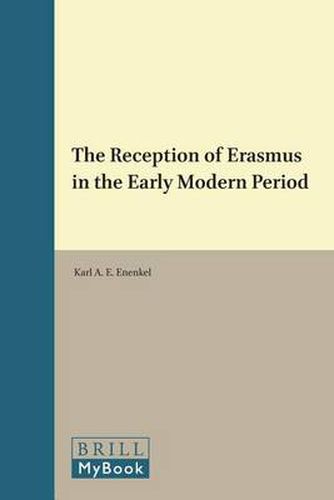Readings Newsletter
Become a Readings Member to make your shopping experience even easier.
Sign in or sign up for free!
You’re not far away from qualifying for FREE standard shipping within Australia
You’ve qualified for FREE standard shipping within Australia
The cart is loading…






Erasmus was not only one of the most widely read authors of the early modern period, but one of the most controversial. For some readers he represented the perfect humanist scholar; for others, he was an arrogant hypercritic, a Lutheran heretic and polemicist, a virtuoso writer and rhetorician, an inventor of a new, authentic Latin style, etc. In the present volume, a number of aspects of Erasmus’s manifold reception are discussed, especially lesser-known ones, such as his reception in Neo-Latin poetry. The volume does not focus only on so-called Erasmians, but offers a broader spectrum of reception and demonstrates that Erasmus’s name also was used in order to authorize completely un-Erasmian ideals, such as atheism, radical reformation, Lutheranism, religious intolerance, Jesuit education, Marian devotion, etc.
Contributors include: Philip Ford, Dirk Sacre, Paul J. Smith, Lucia Felici, Gregory D. Dodds, Hilmar M. Pabel, Reinier Leushuis, Jeanine De Landtsheer, Johannes Trapman, and Karl Enenkel.
$9.00 standard shipping within Australia
FREE standard shipping within Australia for orders over $100.00
Express & International shipping calculated at checkout
Erasmus was not only one of the most widely read authors of the early modern period, but one of the most controversial. For some readers he represented the perfect humanist scholar; for others, he was an arrogant hypercritic, a Lutheran heretic and polemicist, a virtuoso writer and rhetorician, an inventor of a new, authentic Latin style, etc. In the present volume, a number of aspects of Erasmus’s manifold reception are discussed, especially lesser-known ones, such as his reception in Neo-Latin poetry. The volume does not focus only on so-called Erasmians, but offers a broader spectrum of reception and demonstrates that Erasmus’s name also was used in order to authorize completely un-Erasmian ideals, such as atheism, radical reformation, Lutheranism, religious intolerance, Jesuit education, Marian devotion, etc.
Contributors include: Philip Ford, Dirk Sacre, Paul J. Smith, Lucia Felici, Gregory D. Dodds, Hilmar M. Pabel, Reinier Leushuis, Jeanine De Landtsheer, Johannes Trapman, and Karl Enenkel.